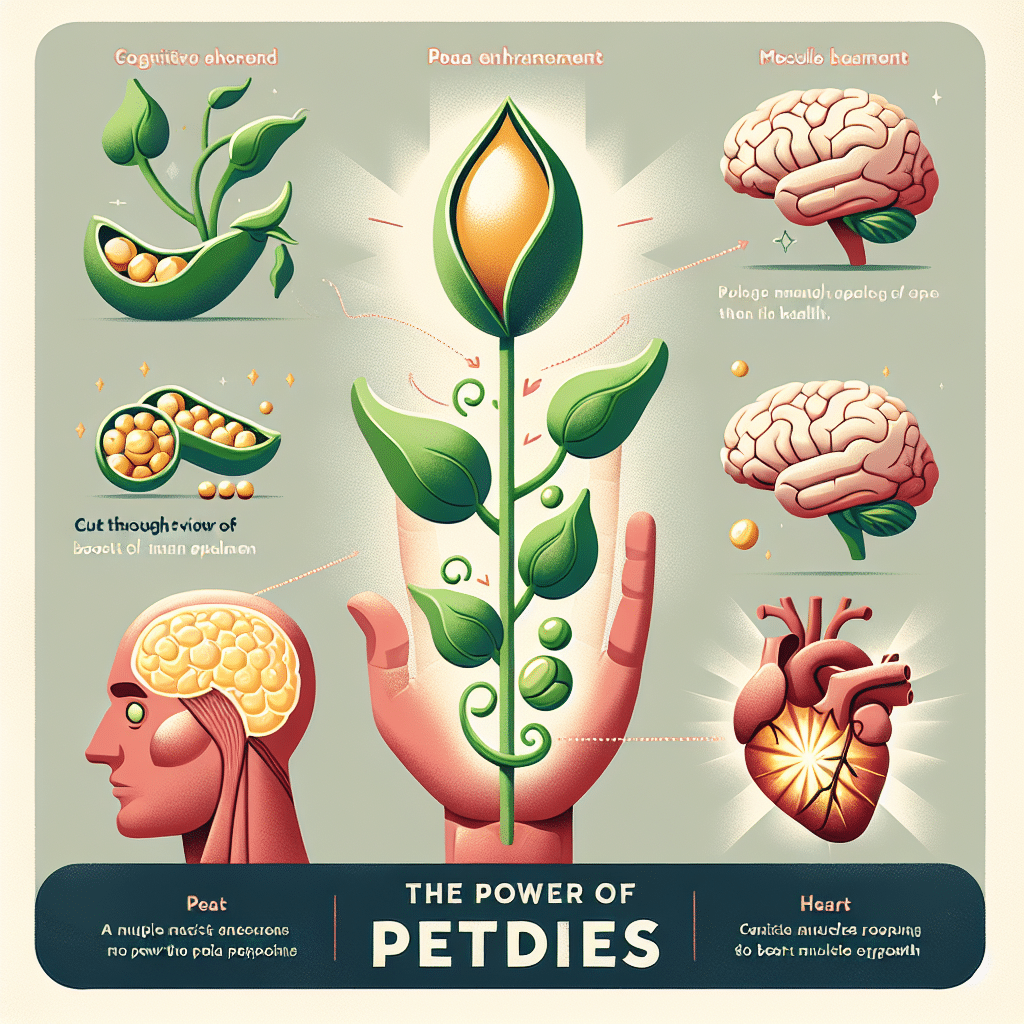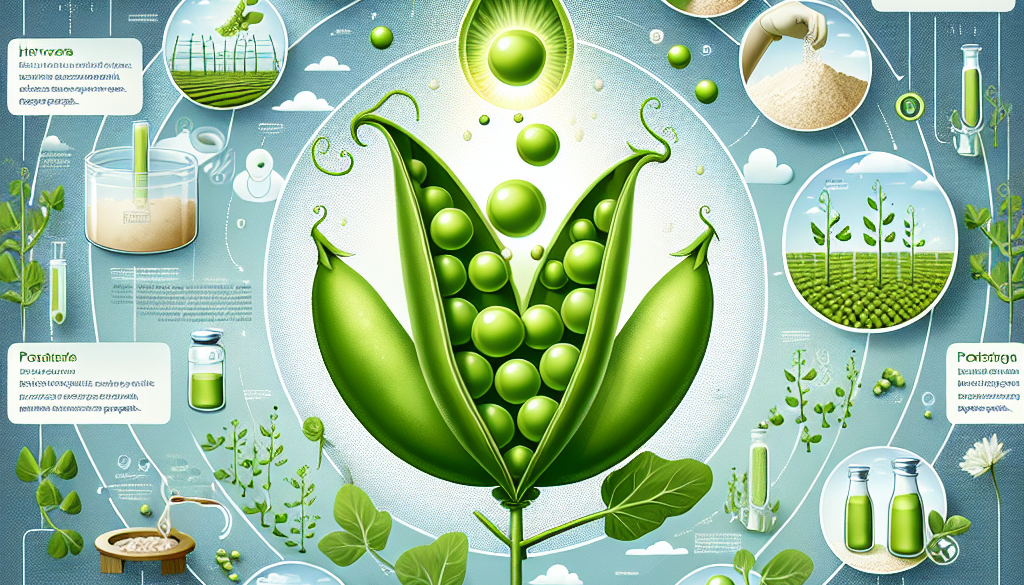Pea Peptide Benefits: The Power of Peptides
-
Table of Contents
- Pea Peptide Benefits: The Power of Peptides
- What are Peptides?
- The Rise of Pea Peptides
- Health Benefits of Pea Peptides
- 1. Muscle Growth and Recovery
- 2. Weight Management
- 3. Heart Health
- 4. Digestive Health
- 5. Antioxidant and Anti-inflammatory Properties
- How to Incorporate Pea Peptides into Your Diet
- Conclusion
- About ETprotein
Pea Peptide Benefits: The Power of Peptides

Pea peptides have gained significant attention in recent years for their numerous health benefits. Derived from yellow peas, these peptides are a rich source of essential amino acids and bioactive compounds that can support various aspects of human health. In this article, we will explore the power of pea peptides and their potential benefits for overall well-being.
What are Peptides?
Peptides are short chains of amino acids, the building blocks of proteins. They play a crucial role in various biological processes in the body, including cell signaling, enzyme function, and hormone regulation. Peptides can be derived from different sources, including plants, animals, and microorganisms.
The Rise of Pea Peptides
Pea peptides have gained popularity in recent years due to their numerous health benefits and their suitability for various dietary preferences, including vegan and vegetarian diets. Pea protein, derived from yellow peas, is processed to extract peptides, which are then used in various applications, including dietary supplements, functional foods, and sports nutrition products.
Health Benefits of Pea Peptides
Pea peptides offer a wide range of health benefits, making them a valuable addition to a healthy lifestyle. Let’s explore some of the key benefits:
1. Muscle Growth and Recovery
Pea peptides are rich in essential amino acids, including branched-chain amino acids (BCAAs) such as leucine, isoleucine, and valine. These amino acids play a crucial role in muscle protein synthesis, which is essential for muscle growth and recovery. Studies have shown that pea peptides can enhance muscle protein synthesis and promote muscle recovery after exercise.
2. Weight Management
Pea peptides have been found to have satiating effects, meaning they can help reduce appetite and promote feelings of fullness. This can be beneficial for weight management, as it may help control calorie intake and prevent overeating. Additionally, pea peptides have a low glycemic index, which means they have a minimal impact on blood sugar levels, making them suitable for individuals with diabetes or those looking to manage their blood sugar levels.
3. Heart Health
Pea peptides contain bioactive compounds, such as peptides with ACE-inhibitory activity, which can help regulate blood pressure. High blood pressure is a risk factor for cardiovascular diseases, including heart disease and stroke. Studies have shown that consuming pea peptides can help lower blood pressure and improve overall heart health.
4. Digestive Health
Pea peptides are a good source of dietary fiber, which is essential for maintaining a healthy digestive system. Fiber helps promote regular bowel movements, prevent constipation, and support the growth of beneficial gut bacteria. Additionally, pea peptides contain bioactive compounds that have been shown to have prebiotic effects, promoting the growth of beneficial gut bacteria and supporting overall gut health.
5. Antioxidant and Anti-inflammatory Properties
Pea peptides contain bioactive compounds with antioxidant and anti-inflammatory properties. These compounds help protect the body against oxidative stress and inflammation, which are underlying factors in various chronic diseases, including cancer, diabetes, and cardiovascular diseases. By incorporating pea peptides into the diet, individuals can benefit from their antioxidant and anti-inflammatory effects.
How to Incorporate Pea Peptides into Your Diet
There are various ways to incorporate pea peptides into your diet to reap their health benefits:
- Add pea protein powder to smoothies or shakes
- Use pea protein-based bars or snacks as a convenient on-the-go option
- Include pea protein in baking recipes, such as cookies or muffins
- Use pea protein as a meat substitute in vegetarian or vegan dishes
It’s important to note that pea peptides are generally safe for consumption, but individuals with specific allergies or medical conditions should consult with a healthcare professional before incorporating them into their diet.
Conclusion
Pea peptides offer a wide range of health benefits, including muscle growth and recovery, weight management, heart health, digestive health, and antioxidant and anti-inflammatory properties. With their rich amino acid profile and bioactive compounds, pea peptides are a valuable addition to a healthy diet. Whether you’re an athlete looking to enhance muscle recovery or an individual seeking to improve overall well-being, incorporating pea peptides into your diet can be a beneficial choice.
About ETprotein
ETprotein is a reputable protein Chinese factory manufacturer and supplier, renowned for producing, stocking, exporting, and delivering the highest quality organic bulk vegan protein and plant proteins. Their offerings, characterized by a neutral taste and non-GMO, allergen-free attributes, cater to a diverse range of industries, including nutraceutical, pharmaceutical, cosmeceutical, veterinary, as well as food and beverage finished product distributors, traders, and manufacturers across the globe.
ETprotein specializes in exporting and delivering tailor-made protein powder and finished nutritional supplements. Their extensive product range covers sectors like Food and Beverage, Sports Nutrition, Weight Management, Dietary Supplements, Health and Wellness Products, and Infant Formula, ensuring comprehensive solutions to meet all your protein needs.
As a trusted company by leading global food and beverage brands and Fortune 500 companies, ETprotein reinforces China’s reputation in the global arena. For more information or to sample their products, please contact them at sales(at)ETprotein.com today.














